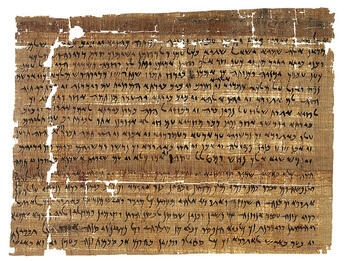Passover Letter
419/418 BCE
To my brothers Jedaniah and his colleagues the Jewish Troop, your brother Hananiah.
May the gods seek the welfare of my brothers at all times.
And now, this year, year 5 of Darius the king, word has been sent to Arsames from the king as follows:
Now, count four[teen days of Nisan and on the 14th at twilight ob]serve [the Passover] and from day 15…
Related Guide
Letters and Communication from the Biblical World
Ancient Israelite messengers carried oral and written communications between people for both personal and official purposes.
Related Guide
Letters from Elephantine
The cache of letters from the Persian-period Jewish garrison at Elephantine are a remarkable witness to social and religious life in the early diaspora.
Hananiah, the author of this letter from 419/418 BCE, was a Jewish member of the Persian administration not resident in Elephantine. He was perhaps an official in charge of Jewish affairs, and was conceivably the same person as Hanani, the brother of the biblical Nehemiah (Nehemiah 1:2; 7:2). The letter is badly damaged, with many lines incomplete. According to the most commonly accepted reconstruction, based on the rules for Passover in the Torah, Hananiah is telling the Jews, on royal authority, when to offer the Passover sacrifice and observe the Feast of Unleavened Bread. Some of the instructions are similar to biblical rules for the holiday (Exodus 12:15a, 18; cf. Leviticus 23:6; Numbers 28:17), but others, about purity, avoiding drink made of fermented grain, and the storage of leaven, are not from the Bible. According to another reconstruction, Hananiah reports that the Persian king has proclaimed a leap year (which entailed adding a month to the year, as it still does in the Jewish calendar today), and that the Jews should therefore defer the festival for a month. Whatever specific details it conveyed, this letter, with its instructions from a royal official to observe a religious festival, is reminiscent of King Hezekiah’s letters about observing Passover, Esther and Mordecai’s “Purim Letters,” and later Jerusalem authorities regarding Hanukkah (2 Chronicles 30:1–9; Esther 9:20–32; 2 Maccabees 1:2–18).
You may also like
Instructions Regarding Children and Inquiry about Passover
Legumes and Barley
Dispatch of Food
Aid for Two Benefactors
Imprisonment of Jewish Leaders



